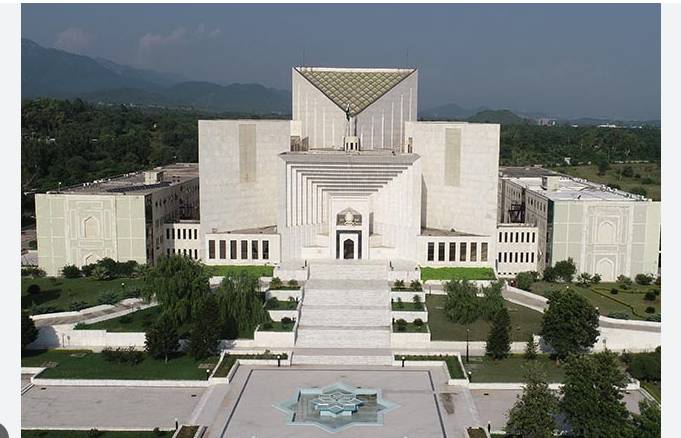SC wants to know reasons for referring cases to military courts: Judge
Justice Mandokhel says section 31-D is invoked only in case of mutiny within army: Justice Hilali says constitution is mother of all laws; it is supreme: Justice Rizvi wonders whether changes made to Army Act later can apply to May 9 suspects

Stay tuned with 24 News HD Android App

Justice Jamal Mandokhel remarked on Monday that there was a mention of several crimes in the Army Act and that all clauses related to these crimes applied to the Pakistan Army personnel, reported 24NewsHD TV channel.
During the hearing of intra-court appeals filed against declaring the trials of civilians in military courts null and void, Justice Aminuddin Khan asked Haris, counsel for the Ministry of Defence, to list those cases which were transferred to military courts and also give reasons for that. “Please keep it brief and try to conclude your arguments by tomorrow.”
A seven-member constitutional bench of the Supreme Court (SC), headed by Justice Aminuddin Khan, heard the pleas.
Haris said that even the constitution had recognized military courts.
Justice Mandokhel said the court was to know the reasons for transferring civilian cases to military courts.
Justice Musarrat Hilali said that the constitution even validated the existence of several tribunals. “What the bench is to determine is which cases would be referred to military courts,” she remarked.
Justice Mandokhel inquired from Haris whether the trials of civilians in military courts would be called a court-martial.
The latter replied, “Yes my lord, it will be called a court-martial.”
Justice Hilali asked what penalty had been laid down in the Army Act for suspending the constitution.
“There is a punishment in Article 6 of the constitution for that. This article is over and above all other laws,” Haris replied.
Agreeing with Haris, Justice Hilali remarked that Article 6 was surely of paramount importance and applied to all. “The constitution is the mother of all laws and is supreme,” she added.
Haris said that civilians could be tried in military courts under Section 31-D of the Army Act.
Disagreeing with him, Justice Mandokhel remarked that the section was invoked only when the army personnel were asked not to perform their duties or incited against the institution’s top brass.
Haris argued that even in military courts, the suspects had rights.
Justice Hassan Azhar Rizvi said the court would like to look at the record of decisions given by these courts to see whether laws were adhered to during trials of different cases.
Justice Aminuddin Khan said the court would ask for the record, if required. “Convicts have now to appeal the courts’ decisions. And we don’t want this has implications for their appeals.”
Concurring with Justice Rizvi, Justice Muhammad Ali Mazhar said it was necessary to see the record.
Justice Rizvi said he wanted to know whether the defendants were allowed to present their witnesses in courts in their defence or not. “I also want to examine the standard of evidence presented in these cases,” he added.
Haris said that the government could show to the bench the record of just one case.
He was of the view that the bench could not review the evidence on merit.
Justice Rizvi, however, said that the apex court did have the power to review the evidence.
The judge recalled that a few changes were made to the Army Act in August 2023. “And the incidents of violence took place in the same year, but on May 9.”
The question was, Justice Rizvi went on to say, whether the changes made at a later stage could apply to the events that took place earlier. “The May 9 suspects were tried under the amended Army Act,” he remarked.
Haris said that the suspects were allowed to hire the services of lawyers.
“We also want to see what criterion has been set for a witness in military courts,” Justice Rizvi said.
Justice Mandokhel remarked he was confused about whether the army’s discipline applied to an ordinary person.
Later giving directives to Haris to conclude his arguments tomorrow, the bench adjourned the hearing until Tuesday.
Reporter Amanat Gishkori
